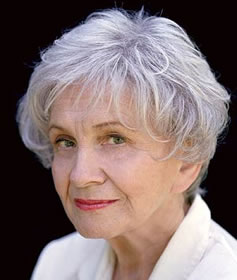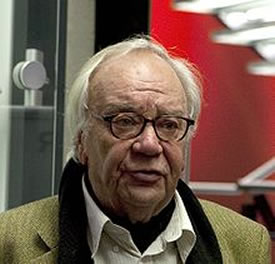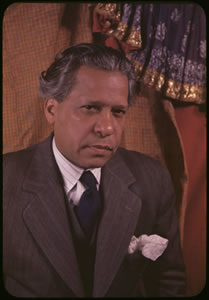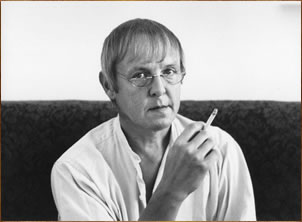De Canadese schrijfster Alice Munro werd geboren op 10 juli 1931 in Wingham, Ontario. Zie ook alle tags voor Alice Munro op dit blog.
Uit: Too Much Happiness
„On the first day of January, in the year 1891, a small woman and a large man are walking in the Old Cemetery, in Genoa. Both of them are around forty years old. The woman has a childishly large head, with a thicket of dark curls, and her expression is eager, faintly pleading. Her face has begun to look worn. The man is immense. He weighs 285 pounds, distributed over a large frame, and being Russian, he is often referred to as a bear, also as a Cossack. At present he is crouching over tombstones and writing in his notebook, collecting inscriptions and puzzling over abbreviations not immediately clear to him, though he speaks Russian, French, English, Italian and has an understanding of classical and medieval Latin. His knowledge is as expansive as his physique, and though his speciality is governmental law, he is capable of lecturing on the growth of contemporary political institutions in America, the peculiarities of society in Russia and the West, and the laws and practices of ancient empires. But he is not a pedant. He is witty and popular, at ease on various levels, and able to live a most comfortable life, due to his properties near Kharkov. He has, however, been forbidden to hold an academic post in Russia, because of being a Liberal.
His name suits him. Maksim. Maksim Maksimovich Kovalevsky.
The woman with him is also a Kovalevsky. She was married to a distant cousin of his, but is now a widow.
She speaks to him teasingly.
“You know that one of us will die,” she says. “One of us will die this year.”
Only half listening, he asks her, Why is that?
“Because we have gone walking in a graveyard on the first day of the New Year.”
“Indeed.”
“There are still a few things you don’t know,” she says in her pert but anxious way. “I knew that beforeI was eight years old.”
“Girls spend more time with kitchen maids and boys in the stables—I suppose that is why.”
“Boys in the stables do not hear about death?”
“Not so much. Concentration is on other things.”
There is snow that day but it is soft. They leave melted, black footprints where they’ve walked.“

De Duitse dichter en schrijver Jürgen Becker werd op 10 juli 1932 in Keulen geboren. Zie ook alle tags voor Jürgen Becker op dit blog.
Landschafts-Gedicht
Nutscheid; Name eines Höhenzuges in der Nähe
hier
kommt bloß wieder Privates zu Wort, also
Wasserscheide, Raketenbasis, Römerstraße; Gehöfte noch
soll es geben ohne Elektrisches aber mit Inzucht
in der Verwandtschaft – nun
ist es ein rauchgrauer Nachmittag;
Hügel, Schlucht und Mischwald; absoluter Schnee, Schnee.
Beobachten können wir
nichts
ist im Augenblick wichtig;
es gibt nur den Winter. Dieses leerstehende Bauernhaus
da, was ist denn damit? nichts für die neue Geschichte;
hier geht es nicht los, weißbleibende Welt. Nicht mal
Rheinland im Matsch, Nutscheid im Wörterbuch
der Familie –
nun hängt unser Exportmodell fest; ich
hab’s ja gesagt; jetzt müssen wir bleiben bis März, bis
alles ganz anders
im Wald kommt da ein Mann und kommt
ein Hund. Das gibt es also, Mann und Hund
und eine Gewißheit: sie zerstören den Schnee, aber
der Schnee, den unser Heimatsender meldet, ist schon da.
Schön, gar nicht zu fassen, ganz wie
früher
immer, jeden Winter, Schnee mit Krieg. Wie nun
kriegen wir den Wagen wieder frei; ich schiebe ja
und rutsche aber immer weg. So stirbt es sich also, hoch
zwischen Siegtal und Bröltal, Wahn in der Nähe
hier
damals hatte Apollinaire zu tun.
Am Mauspfad; Autobahnbau
Der Zaun: steht geschrieben auf den Brettern
des Bauzauns um die Baustelle herum,
und vorbeigehend täglich gl
aube ich
weniger, daß es ein Zaun ist.
Natur-Gedicht
in der Nähe des Hauses,
der Kahlschlag, Kieshügel, Krater
erinnern mich daran –
nichts Neues; kaputte Natur,
aber ich vergesse das gern,
solange ein Strauch steht.

De Cubaanse dichter Nicolás Guillén werd geboren in Camagüey op 10 juli 1902. Zie ook alle tags voor Nicolás Guillén op dit blog.
Ballad of the Two Grandfathers
Shadows which only I see,
I’m watched by my two grandfathers.
A bone-point lance,
a drum of hide and wood:
my black grandfather.
A ruff on a broad neck,
a warrior’s gray armament:
my white grandfather.
Africa’s humid jungles
with thick and muted gongs . . .
”I’m dying!”
(My black grandfather says).
Waters dark with alligators,
morning green with coconuts . . .
”I’m tired!”
(My white grandfather says).
Oh sails of a bitter wind,
galleon burning for gold . . .
”I’m dying”
(My black grandfather says).
Oh coasts with virgin necks
deceived with beads of glass . . .!
”I’m tired!”
(My white grandfather says).
Oh pure and burnished sun,
imprisoned in the tropic’s ring;
Oh clear and rounded moon
above the sleep of monkeys!
So many ships, so many ships!
So many Blacks, so many Blacks!
So much resplendent cane!
How harsh the trader’s whip!
A rock of tears and blood,
of veins and eyes half-open,
of empty dawns
and plantation sunsets,
and a great voice, a strong voice,
splitting the silence.
So many ships, so many ships,
so many Blacks!
Shadows which only I see,
I’m watched by my two grandfathers.
Don Federico yells at me
and Taita Facundo is silent;
both dreaming in the night
and walking, walking.
I bring them together.
”Federico!
Facundo!”They embrace.They sigh,
they raise their sturdy heads;
both of equal size,
beneath the high stars;
both of equal size,
a Black longing, a White longing,
both on equal size,
they scream, dream, weep, sing.
They dream, weep, sing.
They weep, sing.
Sing!
Vertaald door Robert Marquez en David Arthur McMurray

De Duitse dichter en schrijver Kurt Bartsch werd geboren in Berlijn op 10 juli 1937. Kurt Bartsch overleed op 17 januari van dit jaar. Zie ook alle tags voor Kurt Bartsch op dit blog.
Die Männer im Elektrizitätswerk
Die Männer im Elektrizitätswerk
Zünden sich die Morgenzigarette an.
Sie haben, während ich nachtsüber schrieb,
Schwitzend meine Arbeitslampe gefüttert.
Sie schippten Kohlen für ein Mondgedicht.
Uit: Die Hölderlinie
Bruch
Nach Hans Magnus Enzensberger
Die Ordnung zerbricht, der Staat; Rohrbruch; die brechenden Herzen; das Glück bricht; das Glas, ich bitte mich jetzt nicht zu unterbrechen; der Luxus bricht aus, na wenn schon; zerbrecht euch nicht meinen Kopf; Bruchlandung; schade, ich breche in Tränen aus, brechenden Auges; in Lachen auch, heiser und brüchig; zu neuen Ufern breche ich auf, ununterbrochen, bis zum Erbrechen; brecht ruhig den Stab über mich; Wortbruch; das Ende bricht an; der Vers bricht, die Stimme mir auch; willkommende Unterbrechung; ich breche ab, breche auf, ungebrochen; immer der Eure wünsche ich Hals- und Beinbruch.

